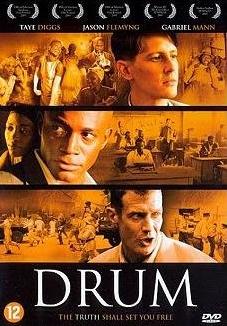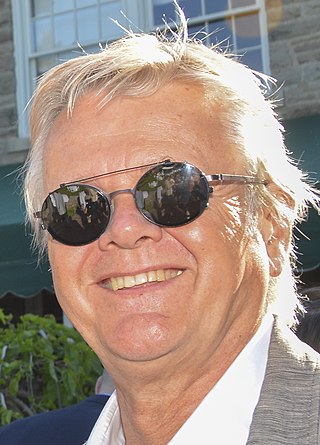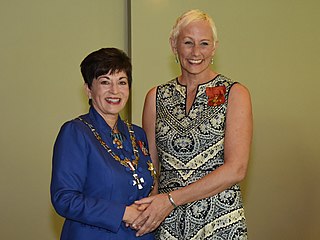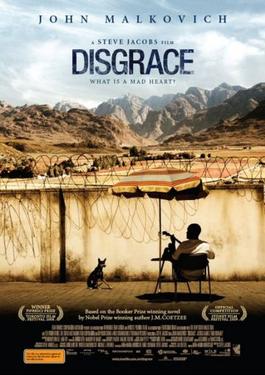Related Research Articles

The Truth and Reconciliation Commission (TRC) was a court-like restorative justice body assembled in South Africa in 1996 after the end of apartheid. Authorised by Nelson Mandela and chaired by Desmond Tutu, the commission invited witnesses who were identified as victims of gross human rights violations to give statements about their experiences, and selected some for public hearings. Perpetrators of violence could also give testimony and request amnesty from both civil and criminal prosecution.
Lionel Ngakane was a South African filmmaker and actor, who lived in exile in the United Kingdom from the 1950s until 1994, when he returned to South Africa after the end of apartheid. His 1965 film Jemima and Johnny, inspired by the 1958 "race riots" in Notting Hill, London, won awards at the Venice and Rimini film festivals. In the 1960s, Ngakane was a founding member of the Pan African Federation of Filmmakers (FEPACI) and Fespaco, the Panafrican Film and Television Festival of Ouagadougou (FESPACO).

Sun City is a luxury resort and casino, situated in the North West Province of South Africa. It is located between the Elands River and the Pilanesberg, about 140 km northwest of Johannesburg, near the city of Rustenburg. The complex borders the Pilanesberg National Park. It is made up of a number of themed sub-resorts with hotels on each, including the original Sun City Resort, The Cabanas, The Cascades and the Lost City.

Drum is a 2004 film based on the life of South African investigative journalist Henry Nxumalo, who worked for Drum magazine, called "the first black lifestyle magazine in Africa". It was director Zola Maseko's first film and deals with the issues of apartheid and the forced removal of residents from Sophiatown. The film was originally to be a six-part television series called Sophiatown Short Stories, but Maseko could not get the funding. The lead roles of Henry Nxumalo and Drum main photographer Jürgen Schadeberg were played by American actors Taye Diggs and Gabriel Mann, while most of the rest of the cast were South African actors.

Sturla Gunnarsson is an Icelandic-Canadian film and television director and producer.

Leanne Pooley ONZM is a Canadian filmmaker based in Auckland, New Zealand. Pooley was born and raised in Winnipeg, Manitoba, Canada, she immigrated to New Zealand in the mid-1980s and began working in the New Zealand television and film industry before moving to England where she worked for many of the world's top broadcasters. She returned to New Zealand in 1997 and started the production company Spacific Films. Her career spans more than 25 years and she has won numerous international awards. Leanne Pooley was made a New Zealand Arts Laureate in 2011 and an Officer of the New Zealand Order of Merit in the New Year's Honours List 2017. She is a member of The Academy of Motion Picture Arts and Sciences.
Darrell James Roodt is a South African film director, screenwriter and producer. He is probably most well known for his 1992 film Sarafina! which starred actress Whoopi Goldberg. Also regarded as South Africa's most prolific film director, Roodt has worked with the late Patrick Swayze in Father Hood, James Earl Jones in Cry, the Beloved Country and Ice Cube in Dangerous Ground.

Skin is a 2008 biographical drama film directed by Anthony Fabian. It is based on the book When She Was White: The True Story of a Family Divided by Race by Judith Stone, and the life of Sandra Laing, a South African woman born to white parents, who was classified as "Coloured" during the apartheid era, presumably due to a genetic case of atavism.

Disgrace is a 2008 Australian film, based on J. M. Coetzee's 1999 novel of the same name. It was adapted for the screen by Anna Maria Monticelli and directed by her husband Steve Jacobs. Starring American actor John Malkovich and South African newcomer Jessica Haines, it tells the story of a South African university professor in the post-apartheid era who moves to his daughter's Eastern Cape farm when his affair with a student costs him his position. The film received generally positive reviews.

Queers Against Israeli Apartheid (QuAIA) was a Toronto-based grassroots organization involved in the movement against what the organization see as Israeli apartheid and is a member of the Coalition Against Israeli Apartheid. The group has been involved in Israeli Apartheid Week as well as Toronto Pride Week. QuAIA formed shortly after the 2008 iteration of Israeli Apartheid Week at which queer activists had a discussion about "pinkwashing", or the use of gay rights as a propaganda tool to justify Israel's policy toward Palestine. The group went on to form contingents for the 2008-2010 and 2012 Pride parades, as well as holding forums, discussion panels and cultural events in Toronto. The group who has been criticized of ignoring the state of LGBT rights in the State of Palestine announced in February 2015 that it was disbanding after seven years of activity.

Sarafina! is a 1992 musical drama film based on Mbongeni Ngema's 1987 musical of the same name. The film was directed by Darrell Roodt and written by Ngema and William Nicholson, and stars Leleti Khumalo, Miriam Makeba, John Kani, Ngema, and Whoopi Goldberg; Khumalo reprises her role from the stage performance.
The Out In Africa South African Gay and Lesbian Film Festival (OIA) is a gay and lesbian film festival launched in 1994 to celebrate the inclusion, in the South African Constitution, of the clause prohibiting discrimination on the grounds of sexual orientation. The Festival set out to address the lack of visibility of Lesbian, Gay, Bisexual, Transgender and Intersex individuals (LGBTIs) in South African social and cultural life after decades of apartheid repression, to counter negative images of LGBTIs that prevail in traditional and religious communities, and to serve as a platform for discussion and debate about the situation of LGBTIs in a newly founded democracy.

The Bang Bang Club is a 2010 Canadian-South African biographical drama film written and directed by Steven Silver and stars Ryan Phillippe as Greg Marinovich, Malin Åkerman as Robin Comley, Taylor Kitsch as Kevin Carter, Frank Rautenbach as Ken Oosterbroek and Neels Van Jaarsveld as João Silva. They portray the lives of four photojournalists active within the townships of South Africa during the apartheid period, particularly between 1990 and 1994, from when Nelson Mandela was released from prison to the 1994 elections.

Steven Silver is a South African / Canadian media entrepreneur, producer, and director. Together with media industry veteran Peter Sussman, Silver co-founded and was the CEO of Kew Media Group Inc., a publicly listed content company that produced and distributed multi-genre content worldwide.
Zulu Love Letter is a 2004 film.

Sea Point Days is a 2008 documentary film about the Cape Town suburb of Sea Point, directed by François Verster.
Barry Stevens is a Toronto-based writer and filmmaker.
Oliver Hermanus is a South African film director and writer. He is known for his films Shirley Adams (2009), Beauty (Skoonheid) (2011), The Endless River (2015), Moffie (2019), and Living (2022). Beauty won the Queer Palm Award at the 2011 Cannes Film Festival.
Dan Jawitz is a South African film and television producer. He is the co-founder of Ice Media, Fireworx Media and Known Associates Entertainment, and he and Mark J Kaplan were both producers of Francois Verster's A Lion's Trail which won an Emmy at the 27th annual News and documentary Emmy Award.
Ekhaya: A Family Chronicle, also known as Molo Fish, is a South African-Canadian television drama miniseries, which aired in 1997. Created by Inner City Films and Kurira Films International for CBC Television and the South African Broadcasting Corporation, the series was based on the life of Clarence Hamilton, a Black South African who was arrested at age 18 for anti-apartheid activism and later fled into exile to Botswana, then Zimbabwe, finally settling in Canada.
References
- 1 2 "A monster's human face" Archived 2019-06-05 at the Wayback Machine . Maclean's , September 15, 1997.
- 1 2 "Toronto International Film Festival: Gerrie & Louise". Playback , September 8, 1997.